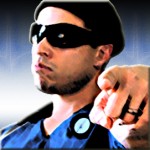
03 May The Doctor is in the Hizzouse
By Kim Schaefer
How did a Stanford hospitalist who makes YouTube videos as his alter ego ZDogg MD end up in Downtown Las Vegas?
That’s a complicated question. So let’s start at the beginning.
Dr. Zubin Damania is the son of two Indian immigrant physicians—his father was in internal medicine and his mother a psychiatrist. They never tried to push him into medicine. In fact, Damania says, “The first thing I thought was that there was no way I was going to do internal medicine. It looks just abjectly miserable. And psychiatry is just weird.” While both of his parents loved their practices, Damania observed the systemic problems that his father faced that made the practice of medicine seem less than appealing.
Instead, Damania went to Berkeley to study music where he says he enjoyed studying musicology, but the performance aspect of the major didn’t appeal to him—which now seems strange in light of how his career has evolved to making music videos about medical issues. As a student he drifted into the sciences and thought it might be fun to try to get into medical school. “I like science, and I like talking to people; therefore, I must like medicine,” he recalls thinking.
At UC San Francisco, Damania found medical school to be both exhilarating and overwhelming. The first two years, filled with science, studying, and building friendships suited him well. It was the third year when things changed. “You actually go into the hospital and start seeing patients. I was overwhelmed. It was such a daunting thing to suddenly be faced with having to perform for the attending physician, for the team, talking to patients, learning how to take care of patients . . . It was one of the most stressful and depressing times,” he recounts. “For me it was this terrifying performance that I had to give. I saw it as a performance because that’s how they treated it. All I really cared about was interacting with patients and engaging with them.”
The stress, coupled with Damania’s natural irreverence, and sense of humor lead to some formative experiences. One with an attending physician who was not impressed by Damania’s lack of respect for the traditional hierarchy that med students are expected to accept without question. “When he gave me my evaluation, he said ‘the residents and interns who supervise you, the patients, they all like you. But I can’t stand you.’ I thought, ‘I’ll do anything I can do to not become this guy.’”
Another formative moment came when his classmates chose Damania to give a commencement address because of his lack of inhibitions. “I gave a speech that’s on YouTube now that parodied the whole process of medical school. Sitting behind me during the speech is Nobel Prize winner Michael Bishop who was the Chancellor at the time . . . It took me half the speech to get him to crack a smile,” he says. That video, a precursor to his current comedic video exploits, has garnered over thirty thousand hits.
As an intern at Stanford, Damania met his wife, Margaret—“We were both miserable,” and to relieve some of that misery, he began looking for an outlet to blow off steam. “So I started doing standup for resident meetings and pharma reps found out about it,” he says, which led to paid gigs for drug companies. “I started getting paid more than my salary. It was very medically-oriented, very cynical, very stress-relieving.”
But it was only a side gig. Medical school was still the focus, but what specialty to choose proved to be problematic. “I was going to do gastroenterology. I thought it was cool, like video games,” he says, referring the disciplines use of scopes and cameras to visualize their patients’ insides. “Then I did the rotation, and I realized that there’s a lot of fucking poo involved.” He also knew that outpatient internal medicine was not for him, because of “the fact that the current healthcare system has turned primary care into a factory treadmill where dozens of patients need to be seen with no time or space to connect or actually get some real healing done,” he explains. “So I ended up going to work for a year in these very small, vaguely medically-related startups in the Bay Area. I realized another thing that I didn’t like—sitting in a cubicle, in meetings all day, doing something for someone else that I didn’t believe in. I thought, ‘the only thing worse than this is poo.’ But poo actually is a step up from flying to New Jersey and meeting with Bristol Meyers Squibb and trying to sell some crap to them,” he recounts.
The offer of a position as a hospitalist at Stanford brought him back to the practice of medicine—a position where he could focus on internal medicine, caring for patients, but without the misery-inducing external practice. He explains, “You communicate with so many people. You communicate with the patient primarily, with the patient’s outside doctor, all the consultants you bring in. It was actually a really good fit. And the best part was that it was at Stanford, so we had interns and residents. I got to be the attending physician that I always hoped my attending physicians would be.” And yet, there was what Damania describes as a vague sense of discontent. “I was on cruise control in my life. I could do this job until I retire, but what would I have done?”
What he really wanted to do was to continue with comedy, in an educational way that helped other doctors, med students, and patients. And so the genesis of the inimitable ZDogg MD. Damania’s site and YouTube videos enabled him to continue as a hospitalist, but also to help different patient advocacy groups, to advocate for issues that matter to him like vaccinations, and to talk about subjects like STDs in a light-hearted, engaging manner. “It was so rewarding. I found I was having so much fun, and I was building an audience of physicians desperate to ward off creeping professional burnout,” he says.
But the changing nature of the medical field, a need for a life “reboot,” and a twenty-year friendship with Tony Hsieh, led Damania and family to ponder the offer to “come to Vegas and do something really important.” After much soul-searching, Damania and his wife, a radiologist who continues her work in the evenings via the internet, decided to take a chance on Downtown Las Vegas.
So, now we know how he ended up here, but what’s next for Damania? He’s pondering a big question: “How do we improve healthcare Downtown and in Vegas in general? And how do we make a model that could be applicable nationally?”
Las Vegas has generally not been known as a place with high quality medical care, and Damania is quick to note that, “Everyone here is concerned with healthcare. Everyone from elected officials down to the guy you meet on the street is concerned with healthcare.” But he also is quick to point out that, “There’s no reason that Vegas shouldn’t be a world class medical center of excellence. There’s absolutely no reason.”
Since his relocation here, Damania has been meeting with a long list of stakeholders in the local medical scene, including physicians, administrators, and politicians. And he sees his role as an outsider and a clinician as an advantage. Not only does it provide him with a fresh and humble perspective on healthcare here, but keeps the focus on creating an environment where the patient care is of the utmost importance. “I’m not a policy expert. I’m not a business expert. I’m a clinical doctor. I think it’s an advantage, personally. And I think you have to come to the table with extreme humility. Because ‘who are you to try to solve these problems?’ But the truth is who is anybody at this point? Who am I not to?” he ponders.
And Damania also sees ZDogg MD as playing an important role in revamping our local healthcare systems. He’ll continue making videos and hopes they’ll serve to promote the work that is being done here to revitalize all aspects of our city while changing the perspective of people who don’t live here. “Las Vegas is no longer just going to be associated with drinking, smoking, and excess,” he says. He also hopes that the videos will attract the attention of highly trained physicians who may want to relocate here to be a part of our community. He is, “extremely optimistic” about that possibility and about the possibility of improving healthcare in Las Vegas. “I think if we can do it anywhere, we can do it here,” he says.

